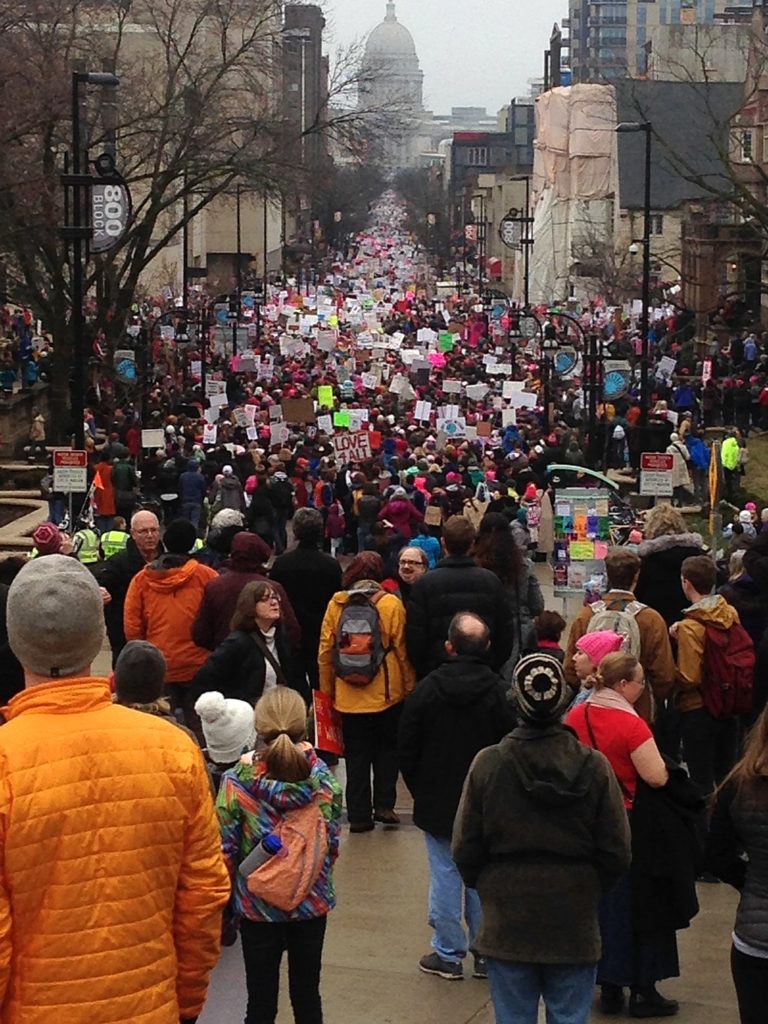This week’s article will be a bit more abstract than other weeks’, because it discusses what might be, as opposed to what is. In fact, I’ve deliberately chosen to talk about things no one in Madison is doing — yet.

What sort of business can be run as a worker co-op? Well, here are some examples: a bakery (there son many), restaurant, engineering firm, medical clinic, construction supplier, wood shop, metal shop, house cleaner (there son many), pizzeria, clothing manufacturer, bike manufacturer, rifle manufacturer, programming, farming, delivery service, landscaping, home health care, taxis, magazine, newspaper, web host, day-care, higher education, even a strip club, y the list goes on. In other words, almost any business at all can be a worker co-op. And the few things that might not be practical as a worker co-op could still be a consumer co-op, worker-consumer hybrid, housing co-op, or credit union, each of which is a whole other subject, with its own interesting examples.
So, what kinds of things could folks in Madison cooperate on? We’ve already seen some great ideas, but there’s always room for more. Here are some thoughts.
Marketing. If there’s one thing every worker co-op in Madison could use some help with, it’s marketing. Naturally, a marketing co-op wouldn’t limit itself to working for co-ops, but it might specialize in them.
Child care. MCDC is in talks with a group of people who want to start a child-care co-op, but this is the kind of service no city will ever have enough of.
Home/business cleaning. This is a proven model in other states (see above). Workers here in Madison would have little difficulty organizing as a cooperative.
Home/business remodeling and retrofitting. This is another sector where skills are largely concentrated in the workers. It wouldn’t be that hard for them to learn self-management, and become worker-owned and operated.
Auto repair. It’s in everyone’s interest to keep cars running as long as they can, and as efficiently as they can.
Sustainability. There is a huge amount of potential here.
- Precious plastics. This is a tested model to pull plastics of all kinds from the wastestream and make something useful out of them. I recommend putting the focus on products that will last for many years (as opposed to high-turnover products like cell phone accessories.) One potential product could be 3D printing material.
- “Unbreakable” glassware. A co-op might start by making Mason jars, but be prepared for a wide variety of uses (glasses, cups, mugs, bottles, plates, bowls, silverware, cookware, jars, windows, solar panels, so on and so forth). It could use existing glass as raw material. It might set up cleaning facilities for bottles and jars, to encourage reuse over recycling. There may be industrial uses where glass could replace plastic, especially in packaging. (Strictly speaking, all glass will break if enough force applied to it, but tempered glass is break-resistant.)
- Aquaculture. Milwaukee is making this work. There’s every reason to think Madison could, too.
- Industrial hemp. Hemp (not marijuana) is an incredibly useful material that can be made into paper, cloth, rope/string/yarn, bio-plastics, drywall, bio-cement, assorted foods, assorted health and beauty products, a replacement for fiberglass, and the list goes on. Hemp is a highly productive plant that requires relatively little water and no pesticides. It can also purify contaminated soil. Hemp products are highly durable, but still biodegradable. The possibilities for worker co-ops here are endless.
Bar. Madison’s worker-cooperators have long wanted a worker-owned and operated bar to gather in.
Coffeehouse. This is a close second to a bar.
Restaurants. Restaurants are well positioned for worker management. Food carts are as well.
Even more ambitious ideas
- Land trusts. This would control multiple pieces of land long-term. It might overlap with housing co-ops.
- Hotel. Workers could own and operate their own hotel. Services will be local, goods as well.
- Commercial real estate. A co-op could own and operate workspaces in desirable areas of Madison. This may have to be a second-tier co-op. It might or might not include the hotel(s) and/or land trusts.
- Web hosting. This would offer web and email services, and other online services focused on privacy and productivity.
- R&D on energy storage that uses cheap, local materials exclusively. Conventional batteries require rare, exotic materials that do extensive ecological damage. We can do better.
MCDC is very interested in connecting people who have ideas (or maybe like one of mine), but haven’t found anyone else to work with. If that describes you, write me at steve@social.coop, or leave us a message on Facebook.